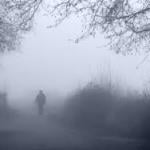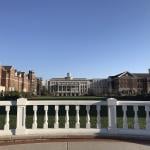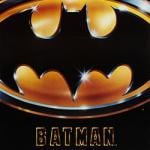Rome, Italy, Jan 6, 2015 / 03:22 pm (CNA/EWTN News).- The Vatican's Secretary of State Cardinal Pietro Parolin voiced enthusiasm at seeing the high number of American seminarians studying in Rome – calling it a sign that vocations are on the rise. “What strikes me is the number of seminarians who are studying here in this college, which means that at least in some areas vocations are growing,” Cardinal Pietro Parolin told American journalists Jan. 6. Cardinal Parolin made his comments at the end of the dedication ceremony for a new addition to the Pontifical North American College in Rome, over which he presided. After starting on the terrace, the cardinal worked his way down, blessing every floor with prayer and holy water. He was accompanied by seminarians who sang and processed with him throughout the celebration. Inaugurated by Bl. Pius IX in 1859, the seminary has spent the last four years at housing capacity, following a several year lull of incoming vocations. The new space was added to meet the needs of a growing community at the college and to enhance their current program for priestly formation. The new addition contains 36,000 square feet spread out across 10 floors. It includes a bishop's lounge with two guest suites, classrooms, a Mass teaching classroom with an altar at the front and a raised ceiling, new offices and a conference room. A private chapel, named after St. John Paul II, was also added to give seminarians a place for secluded prayer. The chapel contains a relic of the saint, as well as stained glass windows of Venerable Michael McGivney, founder of the Knights of Columbus; Venerable Fulton Sheen; St. John Paul II; Blessed Teresa of Calcutta; Mary; and Christ. “I am very, very happy to be here and my joy has increased after the ceremony of the blessing of the new building,” Cardinal Parolin said, and emphasized that the large number of seminarians at the college is “very encouraging news.” He expressed his hope that in addition to the rise in the number of vocations, “the quality of vocations” would also increase. Especially, he said, “the missionary vocation, as Pope Francis has asked of the priests, the ministers of the Church, and all of the Church.” This missionary call, the cardinal observed, means placing oneself entirely at the service of the evangelization of the world, and especially at the service of the poor and most vulnerable of society. For a seminarian to study and receive their priestly formation in Rome is important in terms of understanding the universality of the Church, he explained, saying that to experience the “catholicity” of the Church in this way is perhaps the biggest gift the seminarians receive. The cardinal also pointed out that being in such close proximity to the Holy Father “is not taking anything from the local Churches, but is giving them more strength and more energy in the task they are performing.” Americans, he said, offer the universal Church something unique in terms of “their sense of organization,” and lauded the way the seminarians at the college “are really, really giving their life to the Church.”Editor's note, Jan. 7, 2:30 pm: The original version of this article incorrectly identified the inauguration of the North American College as having taken place in 1959 rather than 1859; Fr. McGivney's first name as Arthur rather than Michael; and Fulton Sheen as a Servant of God rather than Venerable. It has since been corrected. Read more
















